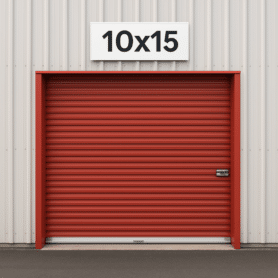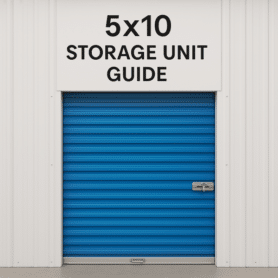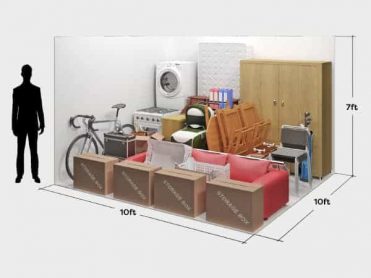So how much does storage cost?
Prices for storage units vary greatly depending on multiple factors such as size, location, amenities, and contract length. A small locker in one area might be a fraction of the cost of a larger unit in a central city like London or Brighton. Here’s an example of pricing across Henfield Storage locations:
- Brighton: Prices for a 10 sq. ft. locker start from £7.47 per week, while a 200 sq. ft. room is £88.87 per week.
- Wimbledon: Starting at £5.59 per week for a locker, and up to £72.84 for a 160 sq. ft. unit.
- Staples Corner: Storage here starts from £5.55 for a 10 sq. ft. locker, with larger 200 sq. ft. units at £104.00 per week.
- Southwark: This central London location starts at £8.24 per week for a locker and rises to £79.44 per week for a 160 sq. ft. unit.
When people talk about storage facilities, it’s always worth considering just how much you’ll be saving by going for the cheapest option. If the best value storage is at the other side of town there will be additional costs related to travelling, plus your own time, and obviously, you still have to pay for the rent of the storage unit.
Is it really worth the hassle to keep your items at a distant location from you to save a few pounds in rent, when overall, you may not actually be saving anything?
Let us look closer at exactly how much it can cost to rent a storage unit.
Factors that affect self storage prices
Location
The location of the storage facility plays a significant role in the price of a unit. For instance, storage units in London are priced higher compared to suburban or regional areas like Brighton or Horsham. Central areas such as Southwark and Staples Corner reflect the demand and cost of real estate in London, making them more expensive.
Normally, when looking for self-storage facilities, most people will just search for “self-storage near me” or “storage units near me”. However, you can opt, of course, to rent a storage unit that’s far from you but is cheaper than the facility nearest to you.
Remember to take into account the money you will save compared to the time/cost involved in travelling to and from your storage unit.
size of unit
Storage units come in a variety of sizes, from small lockers (10 sq. ft.) for documents and seasonal clothing to large units (200 sq. ft.) capable of holding the contents of a 4-bedroom house. Larger units generally cost more, but they offer better value per square foot.
Length of contract
Most storage companies set their prices based on the length of the contract, so expect your cost to increase/reduce based on the duration of the stay in a storage facility. The longer you stay, the higher the chance of storage sites giving you discounts or even some months for free.
Secuirty and Accessibility
Facilities with convenient access options—like 24/7 availability, drive-up units, and features such as lifts and trolleys—usually come at a higher price due to the added ease they offer. Similarly, enhanced security measures like 24-hour CCTV, electronic gate access, and individual entry codes can also raise costs. While these extras increase the overall price, they provide peace of mind and convenience, especially if you’re storing valuable items or need frequent access to your unit.
To compare prices of the best value storage facilities, find a store near you.
- Only choose a distant option if you’ll be storing items that you will not regularly need to access, then you can benefit from low cost and less travel.
- Or, consider a compromise and find a middle ground where it’s not too far and yet it’s not too expensive.
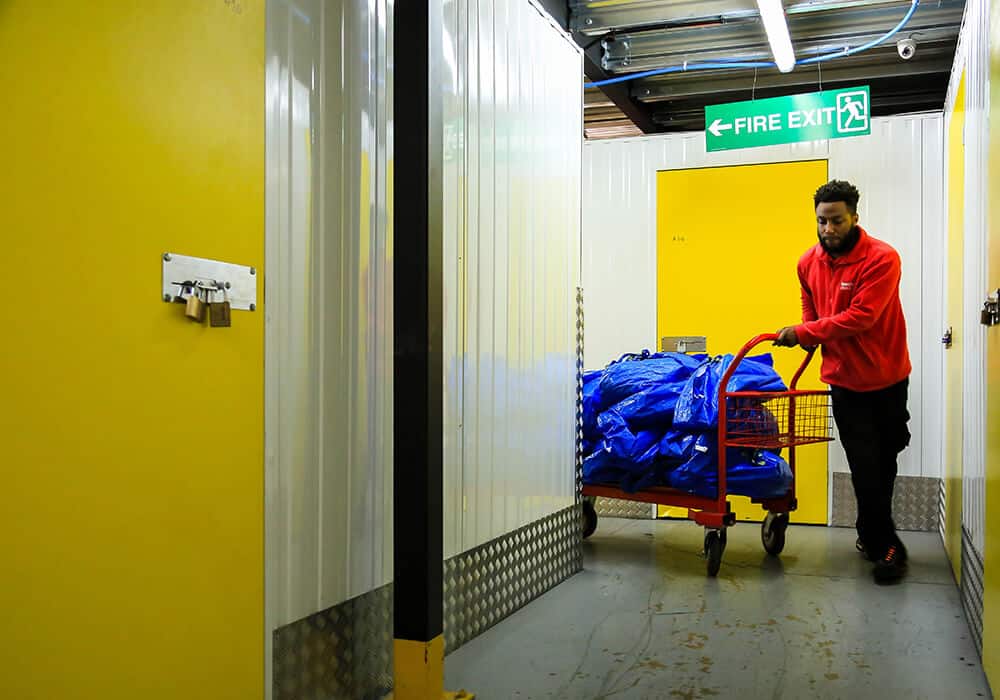
Check this table of the average weekly storage prices across the Uk
|
|||||
|
|||||
|
|||||
|
|||||
|
|||||
*Note: The prices mentioned above reflect national averages from the 2024 SSA UK Annual Industry Report. They do not represent any specific storage location or provider and exclude VAT and contents cover.
Indoor vs Outdoor
The next decision that you have to make is whether you require an indoor or outdoor storage facility for your items. Of course, both options have pros and cons. Indoor storage facility sites have higher operating costs considering all the extra “facilities” or amenities that they offer. Obviously, this can translate to much higher rental costs.
This does not necessarily mean that you should turn to outdoor facilities immediately. Indoor storage sites provide a lot of benefits that outdoor storage just cannot offer. For example, surveillance systems and climate control are exclusive to indoor storage facilities.
On the other side of the coin, outdoor storage units, while comparably cheaper, also have their shortcomings such as an overly simplistic nature of space to store your items in.
Obviously, a car or a boat will not really require an indoor facility. On the other hand, you will find that wooden furniture and clothes fare better in a storage unit where the harsh weather will not reach them.
- Indoor facilities protect your items from harsh weather but they can be costly. On the other hand, outdoor facilities, though cheaper, would not be able to provide many amenities that could secure your items better.
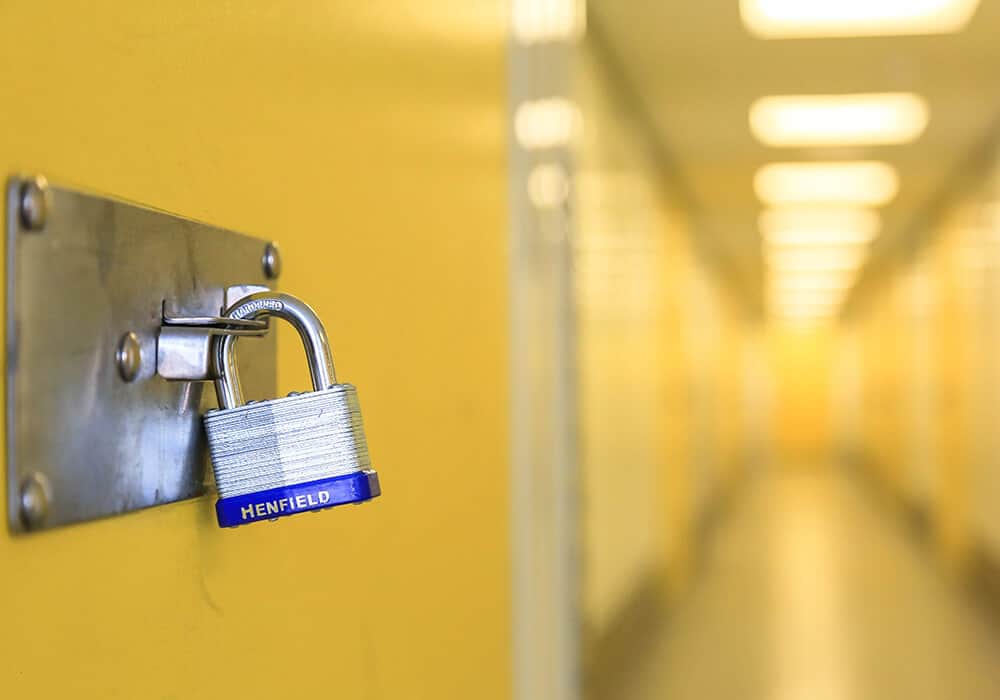
Henfield Storage is an efficient, reliable, and well-priced storage company with friendly, knowledgeable, and extremely helpful staff. I had no issues securing a unit and I felt that my belongings would be left in good hands. Matt and Tim were especially helpful. I would highly recommend!
Understanding Storage Unit Sizes
Choosing the right storage unit size is crucial to ensure you’re not paying for more space than you need, or struggling to fit everything into a smaller unit. Here’s a quick guide to help you determine the right storage unit size for your needs:
25 Square Feet
The size of a small garden shed, this compact unit is perfect for items that don’t require daily access, like boxed seasonal decorations, luggage, or a small collection of tools. You could also store a single mattress, an armchair, or fitness equipment like weights and a stationary bike.
50 Square Feet
Approximately half the size of a standard single garage, a 50-square-foot unit can accommodate the contents of a one-bedroom flat. It’s suitable for storing a queen-sized bed, a dining table, chairs, kitchen appliances, and a few suitcases.
100 Square Feet
Comparable to a single-car garage, a 100-square-foot unit provides ample space for the contents of a two-bedroom house. This size is ideal for furniture like sofas, dining sets, or several large boxes containing things like sports gear, garden tools, or even a motorcycle.
200 Square Feet
Similar to a double garage, a 200-square-foot unit can accommodate the entire contents of a larger home, like a four-bedroom house. You can store several large items such as multiple sofas, bed frames, a wardrobe, large appliances, and outdoor furniture. It’s also a good size for hobbyists who need to store equipment like kayaks, bikes, or large art installations.
What Does the Price of Self Storage Include?
When comparing storage options, you’ll want to know what services and amenities may be bundled into the cost. Depending on the facility, you might find a variety of added benefits designed to improve convenience, accessibility, and security. These features can smoothen out the storage process, and should be factored into the overall value of your storage solution.
Below are some common services that might be included in your storage rental:
- Free parking for added convenience
- Access to trolleys or carts to help transport your items
- Drive-up access for easy loading and unloading directly at your unit
- 24-hour CCTV monitoring to keep your items secure at all times
- Electronic gate access with unique entry codes for added protection
- Covered loading bays to shield your items from the elements during transfer
- On-site staff to assist with deliveries or provide additional support
Just keep in mind that not all of the above will be included in every facility, so it’s worth confirming what’s available before you sign up.
Additional Storage Costs That You May Not Have Considered
We’ve already mentioned the main storage costs that businesses may encounter, but there are a few other expenses you may not have considered. These additional storage costs can quickly add up and impact your budget if you’re not careful.
Contents Protection Plans
Some facilities may offer protection plans that cover damages or losses to your stored items. This can be beneficial for businesses storing valuable or fragile items, but it does come with an additional cost. Depending on the plan and coverage options, this could significantly add to your storage expenses.
Padlocks
Most facilities require you to provide your own padlock, so selecting one that balances security, durability, and convenience is key. For higher security, consider a disc lock or a shrouded padlock, as they are harder to cut and tamper with. Combination locks offer ease of use, but keyed padlocks with hardened steel shackles generally provide better protection.
While HenfieldStorage has state-of-the-art security features, we recommend investing in a quality padlock for added peace of mind.
Packaging materials
While storage units are practically indestrucible, your items may not be. As such, you’ll want to properly pack and protect your belongings, especially if they are sensitive to changes in temperature or humidity.
Using high-quality packing materials such as bubble wrap, packing paper, and sturdy boxes can help prevent damage to your items while in storage. However, these materials do come at an additional cost that should be factored into your budget.
Moving costs
One overlooked aspect of self-storage is the cost of moving your items to and from the facility. If you’re storing a significant amount of belongings or have large, bulky items, you may need to hire a moving company or rent a truck to transport them.
These additional expenses can quickly add up, so it’s essential to factor them into your budget when considering self-storage as an option.
Insurance
While storage facilities typically have insurance for their premises, this does not cover your personal belongings. It’s crucial to consider purchasing insurance for your stored items in case of theft, damage, or natural disasters.
Some storage facilities may offer insurance options as part of their services, but it’s always wise to shop around and compare quotes from different insurance providers to ensure you get the best coverage for your specific needs.
Secure your storage unit with Henfield Storage
Self-storage can be a cost-effective, convenient solution when done right. At Henfield Storage, we recognise that everyone’s storage needs are different. That’s why we offer various unit sizes and flexible rental options to suit your specific requirements. Our modern facilities are secure and equipped with state-of-the-art systems for your peace of mind.
Secure your unit online or contact us to learn more about our services. Let our storage experts assist you in finding the ideal solution. Declutter your space and enjoy the benefits of self-storage with Henfield Storage!
recent posts
can we help you find easy money saving self-storage?
get started

